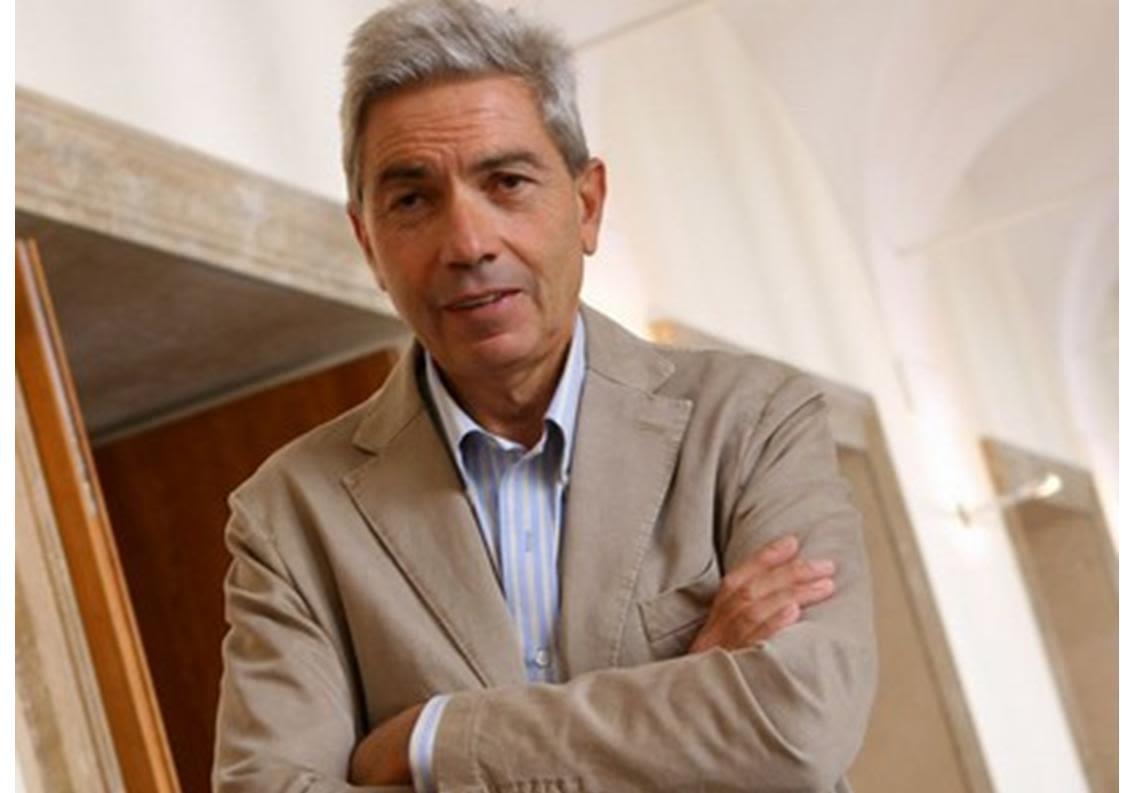

Renato Rascel encapsulated the purest way to show appreciation for Roma in the good times and the bad:
“La Roma non si discute, si ama”
(“You don’t question Roma; you love her”)
The Roman artist, a Roma fan who was ahead of his time, came up with that summary during the most difficult period in the club’s more than 90-year history.
That phrase was uttered for the first time by a celebrity and has become common heritage for all the Giallorossi faithful ever since.
In keeping with the spirit associated with the club, here are testimonials by 13 supporters, some of whom are household names.
Mario Aiello, 34, delivery driver
"For me, 'La Roma non si discute, la Roma si ama' means thinking we are the best side in the league regardless of who’s in the squad, spending hours on YouTube reliving emotions that only this club can generate, living life at the same pace as the fixture list, going to the stadium and thanking the team even after a defeat because nothing else is like Rome or Roma. It’s always magical. A Roma fan from Catania."
Andrea Argenio, 43, university lecturer
“'La Roma non si discute, si ama' is the basis of our secular religion. It’s our polar star that guides our yearly planning in terms of weddings, holy communions, confirmations, holidays and outings with friends, all of which hinge on how the team we love is faring. You might even miss out on a date with the girl you like because you were wildly celebrating a last-minute goal by Stefano Pellegrini against Torino on 8 March 1992!"
Luca Barbarossa, 59, singer-songwriter
"I’m very grateful to Renato Rascel for making me laugh so much as a child with his irresistible sketches and providing so much entertainment with his songs. 'La Roma non si discute, si ama' is a wonderful expression denoting an unwavering sense of belonging, just as love should be. Rascel was a complete and important artist, a Roman like very few others. Now he's 'a spasso per l’azzurrità' (“out and about in the sky”), just like the balloons that he sang about."
Salvatore “Toto” Cascio, 41, public figure
"Fortunately for everyone who supports Roma, myself included, we love the most beautiful and magical club in the world. Although I’m Sicilian and live in Sicily, I started to love the Giallorossi from a young age and began going to the stadium early on as well. I got to meet the whole team thanks to the success of Nuovo Cinema Paradiso, a film that I played a starring role in [he played Salvatore as a boy]. I’ve been a Roma fan ever since. 'La Roma si ama, non si discute.' All the rest is hot air!"
Marco Dionisi, 35, art curator
"On that ill-fated afternoon, Rascel went off-script, took off his actor's cap and spoke from the heart. His thoughts were conceived on stage, which was usually reserved for performances and fiction but on that occasion was overcome by real life and the wonderful blindness generated by love. 'La Roma non si discute, si ama' isn’t just a slogan; it’s the purest essence of being a Roma supporter and a romantic ideal that you can hold on to during the toughest moments. It’s a distinctive badge which you can clutch and feel close to."
Marilena Graziano, 29, singer
“'La Roma non si discute, si ama' is the purest definition of what it means to be a Roma supporter. For a fan like me, who grew up and lives in Bergamo, this phrase is even more heartfelt and meaningful. Despite most people in Lombardy not being Giallorossi supporters, I’m incredibly proud of Roma. I’ve also sung about that love as part of my professional career and have supported the team up close when I’ve been able to. Forza Roma sempre!"
Federico Lattanzio, 37, medieval history researcher at the University of Rome II
"For me, 'La Roma non si discute, si ama' means that Roma is just like my parents and these colours have been genetically passed down to me through to my core: you might experience failure, you might be angry, disappointed or in pain because of the team, but at the end of the day, you love them regardless. 'La Roma non si discute, si ama' is the perfect definition of what Roma means to my family and me. It’s a blood relative with a genetic identity that doesn’t belong to just one context and isn’t simply a passion of a sporting nature."
Federico Lattanzio, 37 anni, ricercatore in Storia Medievale per l’Università di Roma Tor Vergata
“La Roma non si discute, si ama” per me significa che la Roma è come i miei genitori, che questi colori mi hanno geneticamente trasmesso fin dentro il midollo: ti ci puoi scornare, ti possono dare arrabbiature, delusioni, dolori, ma alla fine li ami a prescindere da tutto. "La Roma non si discute, si ama" rappresenta la definizione perfetta di cosa significhi la Roma per me e per la mia famiglia: un rapporto di consanguineità, un segno di identità genetica, non solo un’appartenenza a un contesto, non solo una passione e un tifo di natura sportiva.
Belinda Malfetti, 50 anni, blogger
“La Roma non si discute, si ama” è come un dogma, un modo antico e romantico di vivere il calcio, una sorta di poesia d'amore verso chi nel corso degli anni è riuscita a farmi emozionare, soffrire, sentire parte di una famiglia. La mia Roma è parte di me, è come un parente stretto, uno di quelli che magari in privato puoi rimproverare se sbaglia, ma che con gli altri, con gli estranei, difendi a spada tratta, perché Roma mia non si discute, mai, si ama e basta, di un amore senza condizioni, come dovrebbe essere sempre l'amore.
Barbara Petronio, 47 anni, sceneggiatrice cinematografica e televisiva
L’ho imparato presto ed è il motivo per cui fin da piccola ho tifato questa squadra, senza ripensamenti, con una costanza che forse ho messo in poche altre passioni della mia vita. L’ho imparato il 30 maggio del 1984, al Circo Massimo, insieme a centinaia di migliaia di romanisti che di fronte alla più ingiusta delle sconfitte si abbracciavano come si conoscessero da sempre. L’ho rivissuto il 28 maggio del 2017, quando l’uomo che forse l’ha amata più di tutti, ha dato l’addio al calcio. E sugli spalti eravamo sempre migliaia di tifosi con gli occhi gonfi di lacrime, tutti uniti dalla stessa emozione. Amore, per quei colori e per il vicino che non sai manco come si chiama, ma che porta lo stesso tuo fardello di emozioni inconcepibili per chi non sa che “la Roma non si discute, si ama”.
Antonio Padellaro, 74 anni, giornalista
La Roma non si discute, si ama perché ascere romanisti è un dono che va meritato. Perciò non chiediamoci cosa la Roma può darci, ma piuttosto cosa possiamo dare noi alla Roma.
Belinda Malfetti, 50, blogger
“'La Roma non si discute, si ama' is like a dogma – an old and romantic way of experiencing football, a type of love poetry for those who have given me excitement, made me suffer and also made me feel part of a family over the years. Roma is part of me, just like a close relative, one of those who you might tell off privately if they get something wrong, but you defend them resolutely in front of strangers because you don’t ever question Roma; you love Roma and that’s it. It’s unconditional love, just as love should always be.
Barbara Petronio, 47, film and television screenwriter
I learnt about it at a young age and it’s the reason why I’ve supported this team since I was little, with no second thoughts and with a level of consistency that I’ve put into few other passions in my life. I learnt that on 30 May 1984 at Circo Massimo, alongside hundreds of thousands of Roma fans, who hugged one another as if they had always known each other in the face of the unfairest of defeats. I relived that on 28 May 2017 when the man who may have loved the team more than anyone else bade farewell to the beautiful game. Once again, there were thousands of us in the stands with tears streaming from our eyes, all united by the same emotion of love for the team and our fellow fans, despite not knowing their names. You do know, however, that they carry the same burden of emotions that are inconceivable for anyone who doesn’t know that, 'La Roma non si discute, si ama.'"
Antonio Padellaro, 74, journalist
“'La Roma non si discute, si ama' because being born a Romanista is a gift that has to be earned. Instead of asking ourselves what Roma can give us, we should ask ourselves what we can give Roma."
Mario Stagliano, 67, lawyer
"Sometimes I think it's not true anymore. People do question Roma, and they criticise Roma, on social media, newspapers and TV – often excessively. I prefer to preserve the naivety of the time when Rascel dominated the stage, at the theatre and on TV; when fans would fill the Olimpico even against unattractive teams; when a draw against Mantova or Vicenza was still met with positivity; when the legendary Dante would summon his followers with the cry of 'Daje, Roma, daje.' I was lucky to see Rascel and Dante at work and I still live by that motto. 'La Roma non si discute, si ama.'”
Massimo Wertmuller, 64, actor
"There aren't many things that still bring people together but Roma is one of them. Roma brings everyone together, rich and poor alike, to watch the match. When I was a boy I played for Roma's lupetti team for a while and I learnt about the club's history in an office in San Giovanni: pennants and vintage jerseys forming a Giallorossi shrine. A factory of love that should never be questioned. That's how it is. As long as Roma is Roma, there will be a reason to love. A lasting love."
Valeria, 40, clerk
What does 'La Roma non si discute, si ama...' mean? For some, it's a quote; for others, it's something written inside the 2014-15 shirt; for others still, it's a banner that appeared in Via Vetulonia a few years ago. For me it's all of those things – it sums up a thought, an ideal, that I've had since the first day I fell in love with this club and these colours. I'm not from Rome; I lived in Milan for years but it's something I've always felt. It's what it really means to 'support' a team. It's love, both in joy and pain. It's the sense of everything."

 Tickets
Tickets
 Shop
Shop








































